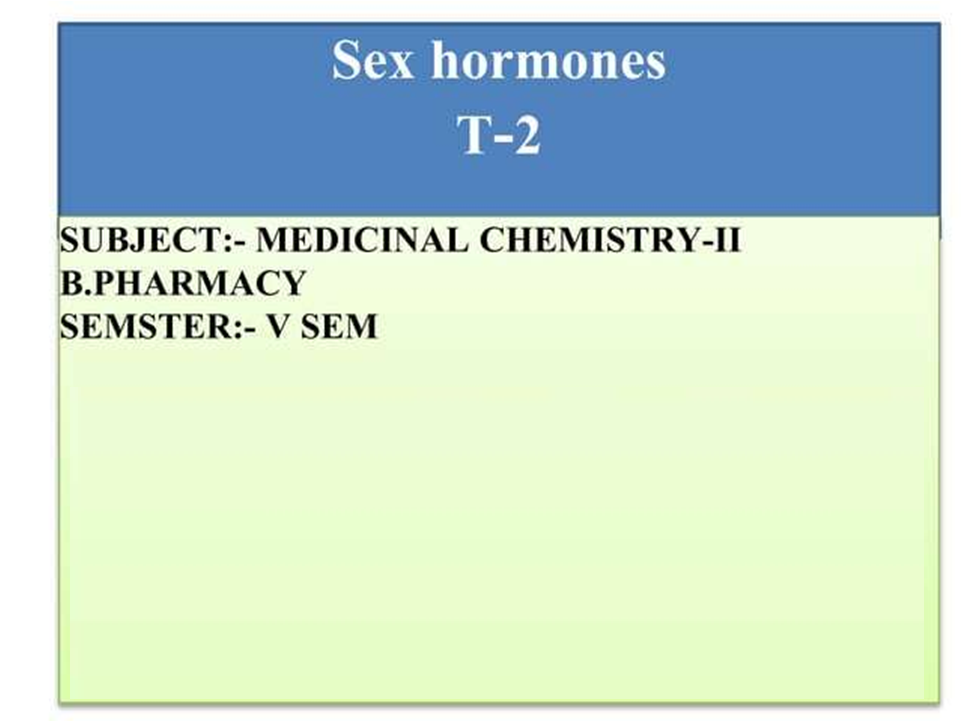Sex Hormones Medicinal Chemistry – PPT
Sex hormones: Testosterone, Nandralone, Progestrones, Oestriol, Oestradiol, Oestrione,
Diethyl stilbestrol.
Sex Hormones ppt
Introduction to Sex Hormones
- Definition: Sex hormones are steroid hormones produced primarily by the gonads (testes and ovaries) that regulate reproductive functions and secondary sexual characteristics.
- Classification:
- Androgens: Male sex hormones
- Estrogens: Female sex hormones
- Progestogens: Hormones involved in the menstrual cycle and pregnancy
Slide 3: Testosterone
- Chemical Structure: Testosterone is a steroid hormone derived from cholesterol. It has a cyclopentanoperhydrophenanthrene ring structure typical of steroid hormones.
- Functions:
- Promotes development of male reproductive organs.
- Stimulates muscle growth and secondary male characteristics.
- Regulates libido and bone mass.
- Clinical Applications:
- Used in testosterone replacement therapy for hypogonadism.
- Also used for muscle wasting disorders.
SAR Note: Modifications on the A-ring and 17-position influence its anabolic and androgenic activity.
Slide 4: Nandrolone
- Chemical Structure: Nandrolone is a synthetic anabolic steroid structurally similar to testosterone, with a missing carbon at the 19-position.
- Functions:
- Strong anabolic effects, promoting muscle mass and bone density.
- Weak androgenic activity compared to testosterone.
- Clinical Applications:
- Used in the treatment of anemia and osteoporosis.
- Prescribed for wasting syndromes associated with chronic diseases.
SAR Note: Removal of the methyl group at C-19 reduces androgenic effects while maintaining anabolic properties.
Slide 5: Progesterone
- Chemical Structure: Progesterone is a C21 steroid hormone with a 4,5-diene structure and a ketone group at the 3-position.
- Functions:
- Regulates the menstrual cycle and maintains pregnancy.
- Prepares the endometrium for implantation.
- Prevents uterine contractions during pregnancy.
- Clinical Applications:
- Used in hormone replacement therapy (HRT) and oral contraceptives.
- Treats conditions like amenorrhea and endometriosis.
SAR Note: The presence of a keto group at C-3 and a double bond at C-4 are critical for progesterone activity.
Slide 6: Estradiol
- Chemical Structure: Estradiol is the most potent natural estrogen, with a phenolic A-ring and a hydroxyl group at the 17-beta position.
- Functions:
- Promotes development of female secondary sexual characteristics.
- Regulates the menstrual cycle and maintains bone health.
- Plays a key role in fertility and ovulation.
- Clinical Applications:
- Used in HRT and contraceptives.
- Treats menopausal symptoms and osteoporosis.
SAR Note: The hydroxyl groups at C-3 and C-17 are critical for estrogenic activity.
Slide 7: Estrone
- Chemical Structure: Estrone is a less potent estrogen with a ketone group at the C-17 position instead of a hydroxyl group.
- Functions:
- Weaker estrogen compared to estradiol.
- Predominant estrogen in postmenopausal women.
- Clinical Applications:
- Used in menopausal therapy, especially in estrogen-deficient conditions.
- Acts as a precursor to estradiol in the body.
SAR Note: The keto group at C-17 results in lower potency compared to estradiol.
Slide 8: Estriol
- Chemical Structure: Estriol has hydroxyl groups at C-3, C-16, and C-17, making it the weakest natural estrogen.
- Functions:
- Main estrogen produced during pregnancy.
- Plays a role in maintaining pregnancy by regulating the uteroplacental blood flow.
- Clinical Applications:
- Primarily used in HRT for postmenopausal women.
- Potential protective role against breast cancer in some studies.
SAR Note: The triple hydroxyl groups reduce its potency and estrogenic activity.
Slide 9: Diethylstilbestrol (DES)
- Chemical Structure: Diethylstilbestrol is a synthetic non-steroidal estrogen with two aromatic rings connected by an ethylene bridge.
- Functions:
- Mimics the effects of natural estrogens like estradiol.
- Clinical Applications:
- Previously used in preventing miscarriages (now discontinued due to risks).
- Occasionally used in certain estrogen-deficient states and prostate cancer therapy.
SAR Note: DES is more stable than natural estrogens, but its prolonged use is associated with an increased risk of cancer.
Slide 10: Summary of Hormone Functions
- Androgens (Testosterone, Nandrolone): Regulate male sexual development, muscle mass, and bone density.
- Progestogens (Progesterone): Key for pregnancy maintenance and menstrual cycle regulation.
- Estrogens (Estradiol, Estrone, Estriol): Regulate female reproductive function, promote bone health, and are crucial in pregnancy.
- Synthetic Estrogens (Diethylstilbestrol): Previously used for pregnancy-related issues, but with significant side effects.
Slide 11: Clinical Applications Overview
- Testosterone/Nandrolone: Hormone replacement, muscle wasting diseases.
- Progesterone: Oral contraceptives, HRT, reproductive disorders.
- Estrogens (Estradiol, Estrone, Estriol): Menopausal therapy, osteoporosis, contraception.
- Diethylstilbestrol: Historical use in pregnancy complications and cancer therapy.
Slide 12: Conclusion
- Key Takeaways:
- Sex hormones play a critical role in regulating reproductive functions and secondary sexual characteristics.
- Understanding their structure-activity relationships (SAR) helps in optimizing clinical therapies.
- Caution is required when using synthetic hormones like DES due to potential side effects.
Slide 13: References
- List of key references and resources for further reading.
Sex Hormones ppt
To Join In Whatsapp group Click below Link
https://chat.whatsapp.com/ERzsuXoDDnOLBZ3spkddn5
To Join Telegram Channel Click Below Link
https://t.me/careerpathwayjobs
To know the Latest Job updates click below Link
Career Pathway – Guide to your success



medicinal chemistry- 2 unit -4 topics was covered in this ppt.